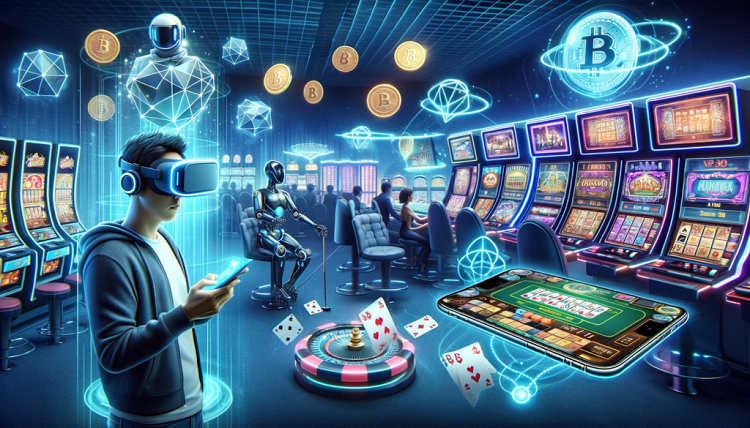
Online gaming has emerged as a dominant form of entertainment in the 21st century, captivating millions around the globe with its immersive experiences and social interactions. As technology continues to evolve, online gaming has expanded beyond simple pastimes into a multifaceted industry that shapes culture, economics, and social dynamics. From casual mobile games to competitive esports, online gaming has transformed the way we engage with digital content and interact with one another.
The Evolution of Online Gaming
The origins of online gaming can be traced back to the early days of computer networking. In the late 1970s and early 1980s, text-based games, known as multi-user dungeons (MUDs), allowed players to connect over dial-up modems. However, the real breakthrough came in the late 1990s with the rise of graphical internet games and the introduction of broadband connectivity. Titles like Quake and Ultima Online set the stage for the modern online gaming experience, allowing players to compete and collaborate in real-time.
The launch of World of Warcraft in 2004 marked a significant turning point in the gaming landscape. This MMORPG captivated millions with its expansive world and complex gameplay, establishing a framework for future online games. Today, platforms like Steam, Xbox Live, and PlayStation Network facilitate multiplayer gaming, enabling players to connect across the globe. As mobile technology has advanced, games like Candy Crush Saga and Among Us have reached massive audiences, further demonstrating the versatility and appeal of online gaming.
The Social Aspect of Online Gaming
One of the most significant impacts of online gaming is its ability to foster social connections. Online games have evolved into social platforms, where players can form friendships, collaborate on challenges, and engage in shared experiences. This social aspect can be particularly beneficial for individuals who may struggle with traditional forms of socialization.
- Community Building: Online gaming communities thrive around shared interests and experiences. Players often join guilds, clans, or teams, creating a sense of belonging and camaraderie. These communities can lead to lifelong friendships, as players connect not only through gaming but also through shared experiences outside of the virtual world.
- Social Interaction: Many games emphasize teamwork and communication, requiring players to work together to achieve objectives. This collaboration can enhance social skills and foster a sense of unity among players. Voice chat and messaging systems within games allow for real-time communication, making it easier for players to strategize and socialize.
- Cultural Exchange: Online gaming transcends geographical boundaries, bringing together individuals from diverse backgrounds and cultures. Players interact with others from around the world, fostering cross-cultural understanding and collaboration. This cultural exchange enriches the gaming experience and can lead to new friendships and perspectives.
The Rise of Esports
Esports has rapidly gained popularity, transforming online gaming into a competitive spectacle. Professional gamers now compete in organized tournaments, drawing massive audiences and lucrative sponsorships. Esports events have become major cultural phenomena, with millions tuning in to watch their favorite teams and players compete for significant prize pools.
- Professionalization of Gaming: Esports has turned slot gacor gampang menang into a viable career path for many individuals. Professional players, coaches, analysts, and content creators can earn substantial incomes through sponsorships, streaming, and tournament winnings. This professionalization has elevated the status of gaming within the broader entertainment industry.
- Major Events: Tournaments like The International for Dota 2 and the League of Legends World Championship attract massive viewership, rivaling traditional sports events. These competitions are often held in large arenas, with fans attending in person to support their favorite teams. The sense of community and excitement around these events contributes to the growth of esports as a legitimate form of entertainment.
- Streaming Platforms: The rise of streaming platforms like Twitch and YouTube Gaming has further fueled the popularity of esports. Gamers can share their gameplay experiences with audiences in real-time, building communities around their content. Many streamers have turned their passion for gaming into successful careers, earning income through subscriptions, donations, and sponsorships.
Economic Impact of Online Gaming
The online gaming industry has grown into a multi-billion-dollar market, with revenue generated through various channels, including game sales, subscriptions, in-game purchases, and advertising. The economic impact of online gaming extends beyond game developers, influencing multiple sectors.
- Diverse Revenue Streams: The business model for online gaming has evolved to include microtransactions, allowing players to purchase in-game items and enhancements. This model has proven to be highly lucrative, particularly for free-to-play games that attract a large player base.
- Job Creation: The growth of the gaming industry has led to the creation of numerous jobs, ranging from game development and design to marketing and customer support. As the industry continues to expand, the demand for skilled professionals in various roles is likely to increase.
- Sponsorships and Advertising: As online gaming gains mainstream popularity, brands are increasingly turning to gaming for marketing opportunities. Sponsorships and advertisements within games and during esports events have become significant revenue sources for developers and organizers.
Challenges in Online Gaming
Despite its many benefits, online gaming also faces several challenges that need to be addressed:
- Gaming Addiction: The immersive nature of online games can lead to excessive play, resulting in negative consequences for individuals’ mental and physical health. Gaming addiction has become a recognized issue, prompting discussions around responsible gaming and the need for support systems.
- Toxic Behavior: Toxicity and harassment within online gaming communities remain significant concerns. Many players encounter negative experiences, including bullying and discrimination. Game developers are increasingly implementing reporting systems and moderation tools to combat toxic behavior and create more inclusive environments.
- Privacy and Security: Online gaming requires players to share personal information, raising concerns about privacy and data security. Cybersecurity threats, including hacking and account theft, are ongoing issues that both players and developers must navigate.
The Future of Online Gaming
The future of online gaming is poised for continued growth and innovation, driven by advancements in technology and changing player expectations.
- Cloud Gaming: Cloud gaming services allow players to access games without the need for high-end hardware. This technology has the potential to democratize gaming, making it more accessible to a broader audience. As internet speeds improve, cloud gaming may become a mainstream method of accessing games.
- Virtual Reality (VR) and Augmented Reality (AR): VR and AR technologies are transforming how players experience games. Titles like Beat Saber and Pokémon GO showcase the potential for immersive gameplay and real-world interaction. As these technologies advance, we can expect more innovative gaming experiences that blur the lines between the virtual and physical worlds.
- Integration of AI and Machine Learning: Artificial intelligence and machine learning are beginning to play a significant role in online gaming. From creating intelligent NPCs to personalizing player experiences, AI can enhance gameplay and make it more engaging. This technology can also be used to combat cheating and improve player matchmaking.
Conclusion
Online gaming has become a cultural and economic juggernaut, reshaping how we interact with technology and each other. Its impact extends far beyond mere entertainment, influencing social dynamics, economic trends, and even career paths. As the industry continues to evolve, the future of online gaming promises exciting innovations and opportunities, making it an integral part of modern life. With its ability to connect people and foster communities, online gaming is poised to remain a significant force in the digital landscape for years to come.



